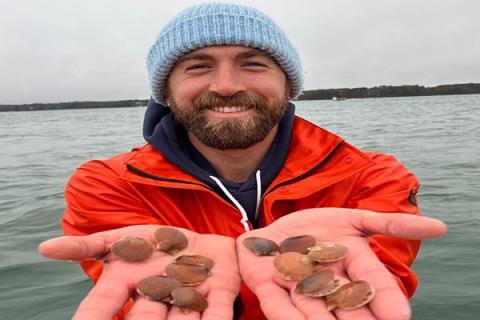
This N.H. researcher found a new, more sustainable way to grow scallops
Michael Coogan, a research assistant professor with UNH’s Center for Sustainable Seafood Systems, has developed a way to farm scallops in deep offshore waters with minimal gear, eliminating entanglement danger to North Atlantic right whales. Read the Boston Globe article

Innovative Aquafort Project Boosts Local Fish Supply Amid US Shortages
News Center Maine covered how the University of New Hampshire is using floating pens to sustainably raise steelhead trout, boosting local seafood supply. Watch the Segment
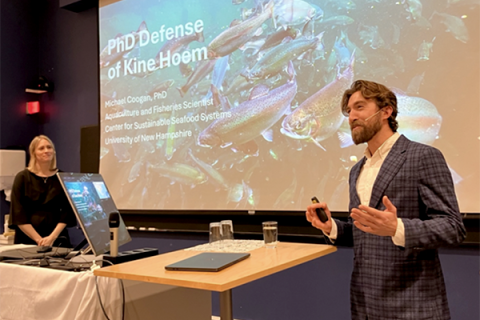
Being an Opponent in Norway
In May of 2025, CSSS members Michael Coogan and Michael Chambers had unique experiences being an opponent for two Ph. D. students at the Norwegian University of Science and Technology (NTNU) in Alesund, Norway. Learn more

Sustainable Seafood and Save the Whales!
Our Center for Sustainable Seafood Systems director and professor, Dr. Dave Fredriksson, discusses UNH's new aquaculture farming of Steelhead Trout and our efforts to save the whales on the radio show podcast from WUNH. Listen In
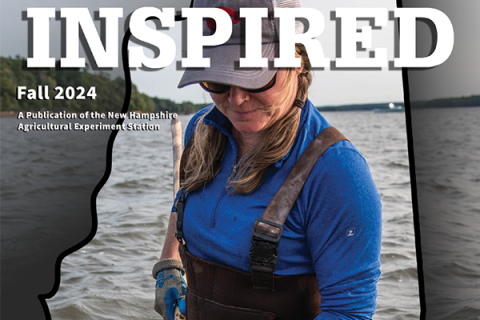
INSPIRED Aquaculture Research Report, Fall 2024
The NH Agricultural Experiment Station continues its mission of advancing science with this report highlighting research on species management, water quality, and environmental monitoring. Read Up

Sustainable Seafood Approaches for New Hampshire
From the UNH Center for Coastal & Ocean Mapping/Center for Ocean Engineering Center's Seminar Series: David W. Fredriksson, director of the UNH Center for Sustainable Seafood Systems presents at UNH's Jere A. Chase Ocean Engineering Laboratory. Watch More
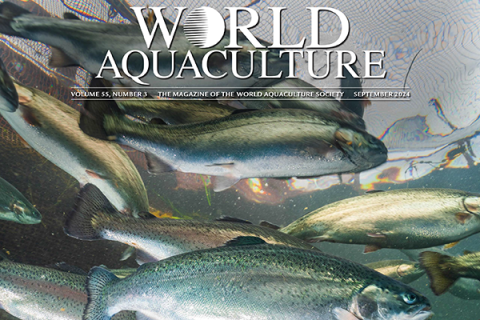
AquaFort, a Floating, Integrated Multi-trophic Aquaculture System
Just offshore New Castle, NH lies the UNH AquaFort. The AquaFort is a floating platform that raises steelhead trout, blue mussels and sugar kelp. Nutrients from the fish are extracted by the lower trophic shellfish and seaweed species leaving less of an impact on the environment. It’s used for aquaculture education, training and research. Learn more
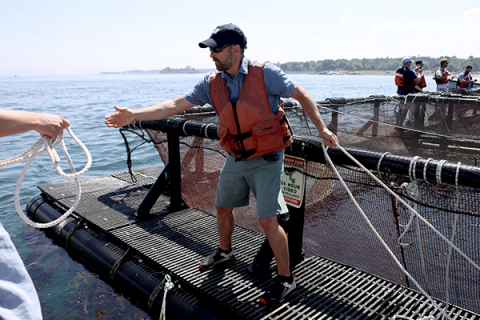
How can a floating fort help produce more sustainable seafood?
Dave Fredriksson, director of the Center for Sustainable Seafood Systems at the University of New Hampshire, grabbed a rope as his colleagues pulled up to UNH’s floating AquaFort off of New Castle, N.H. Inside the netting of the sea pen — known as the AquaFort — are around 3,000 steelhead trout that have been growing over the winter, many of which are destined for dinner plates at a local restaurant about a mile away. Learn more
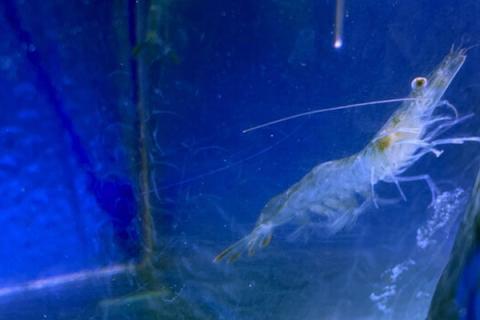
New Hampshire IMTA Study Shows Oysters Reduce Nitrogen in Shrimp Farming
New research out by graduate student and scientist Elizabeth Martin with funding support from both the UNH Center for Sustainable Seafood Systems and UNH College of Life Sciences and Agriculture, advised by Michael D. Chambers, with Dave Fredriksson, Mike Coogan and Chris Neefus. Lizzy studied nitrogen production from shrimp with corresponding nitrogen uptake rates with gracilaria (instead of using a biofilter). She also investigated treatments with oysters. Learn more

Deep Water Seaweed Farming Successful Technology Demonstration in Maine
Members of the CSSS, Michael Chambers, Zach Moscicki, Rob Swift and Igor Tsukrov collaborated with Umaro Foods, Otherlabs, Kelson Marine and Stationkeep LLC to design and test a resilient, low-cost system for growing macroalgae (a.k.a seaweed) at large scales in the open ocean environment. The project is funded by the US Department of Energy ARPA-E’s MARINER program, which aims to encourage technologies that could someday support a macroalgae based biofuel industry. This presentation serves as summary of the key project objectives. View PDF
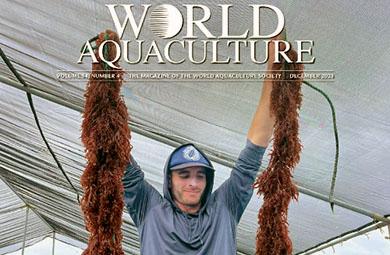
A New Paradigm in Offshore Macroalgae Farming: Reducing the Risk of Marine Mammal Entanglement
Protecting vulnerable marine mammal species like the North Atlantic right whale is a major priority in promoting a responsible seafood industry. With concerns regarding potential rope entanglements, this publication discusses a recent approach to reduce ropes used in kelp farming by replacing them with composite rod. This composite rod line is deployed to resist any potential entanglements, minimizing the risk to marine mammals. Learn more
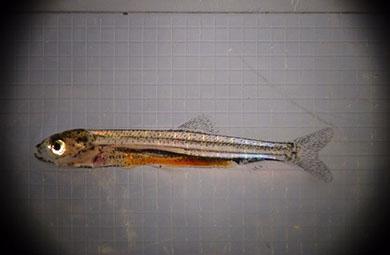
Aquaculture Research at UNH:
Using Fish Physiology to Help Growers of Commercially Important Species
The work done in the Berlinsky Lab at UNH helps to improve the cultivation of commercially important finfish species by understanding and ultimately controlling physiological processes. For example, by understanding reproductive processes, researchers can control the timing of fish breeding, alter the ultimate sex of fishes in an aquaculture system, and enhance egg quality. Learn more
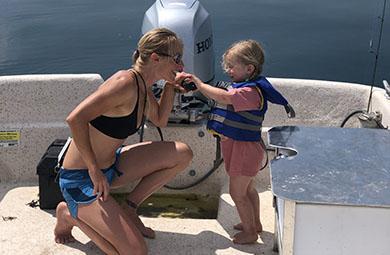
Graduate Student Feature: Gender Equity in Aquaculture
Graduate Research Fellow and former intern of Michael Chambers, Natalie Lord, researched the gender norms of the aquaculture industry. Entering into a previously male-dominated sector has often been a challenge for women and they are working hard to dismantle the perceptions of traditional roles for women in the maritime sector. Learn more

Open Ocean Aquaculture symposium presentation
On October 6, 2022, Michael Chambers joined a team of aquaculture experts presenting material at the Commonwealth of the Northern Mariana Islands (CNMI) Offshore Aquaculture Symposium. The goal was to initiate a new aquaculture industry that would create seafood security for the local population and provide opportunity to export seafood to other Pacific Islands. Dr. Chambers presented on behalf of the CSSS with a focus on how his Integrated Multi-trophic Aquaculture (IMTA) work can be applied for island communities.
View PDF

Aquaculture Research at UNH:
Using Lumpfish in Aquaculture Production
The University of New Hampshire has been working with the New England aquaculture industry (salmon farmers in Maine and steelhead trout farmers in N.H.) to promote the use of cleaner fish in salmonid cage culture to control parasitic sea lice in a more environmentally friendly and natural way. Learn more

Oyster farmers raising awareness of industry with Oyster Fest
Oyster Week 2022 closed with Oyster Fest at Bernie's Beach Bar in Hampton. The event showcased music, drinks and all-you-can-eat oysters from six local farmers. The New Hampshire Shellfish Farmers Initiative organized the event and is made up of all 14 oyster farmers in the Seacoast. Organizers want people to know the environmental and economic benefits of oyster farming. Learn more
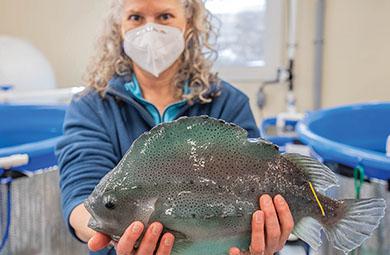
Building Momentum for the Blue Economy
From harnessing the tides to protecting coastal resources, UNH is at the nexus of conserving and leveraging the power of the sea. When it comes to the economy, the ocean is a major player — from tourism to energy, seafood to shipping, the world’s marine-related assets tally up to trillions of dollars. But our oceans and coastlines are facing unprecedented pressures. Learn more

Sustaining the Seas – UNH Sustainable Seafood Director Hired

Mike Chambers Talks Marine Jobs on PBS Roadtrip Nation
UNH Marine Biologist, Aquaculture Specialist, and Associate Professor Michael Chambers discussed marine biology and aquaculture on PBS Roadtrip Nation's segment exploring skilled jobs with serious potential. Check out his various clips, highlights, milestones, and career path history. “Get your hands wet.” Learn more

NH-Grown Striped Bass Aquaculture
Research from UNH helmed by David Berlinsky with Linas Kenter is developing saltwater striped bass aquaculture, paving the way for a new industry to grow striped bass. Hear why striped bass are a unique opportunity for aquaculture from Dr. Kenter and chef Brendan Vesey of Botanica Restaurant and Gin Bar. Learn More

The AquaFort: Revolutionizing local aquaculture in New Hampshire
Just offshore of New Castle, New Hampshire, Sea Grant researchers are teaming up with local fishermen and farmers to create a new model for sustainable, small-scale finfish aquaculture: The AquaFort. Funded by the Sea Grant National Aquaculture Initiative’s 2018 aquaculture research awards. Learn more

UNH Receives $5M to Expand Its Commitment to Sustainable Seafood

Seafood Solutions – For a Global Food Source

Steelhead Trout Making a Splash
Thanks to the work of researchers at N.H. Sea Grant and UNH Cooperative Extension, New Hampshire-raised steelhead trout are making a splash in restaurants and seafood markets across northern New England. Experts discuss the importance of responsible aquaculture for sustainable seafood and how “the legendary UNH steelhead trout” started winning accolades after just one season. Learn More

Marine Aquaculture: A Promising Future
Mussels, kelp and trout grown off the coast of Portsmouth, N.H. are fulfilling demand for local seafood while removing excess nutrients from the water. This video from NOAA Fisheries focuses on marine aquaculture and features N.H. fishermen, chefs, UNH professor Hunt Howell and NHSG/UNHCE marine aquaculture specialist Michael Chambers. Learn More

Small-scale, submersible fish cages suitable for developing economies
Achieving food security in developing nations is a mission of numerous governmental and international organizations. Small-scale aquaculture, both on land and sea, can aid this effort through the consistent production of seafood supplied to a local population within a geographical region. Learn more